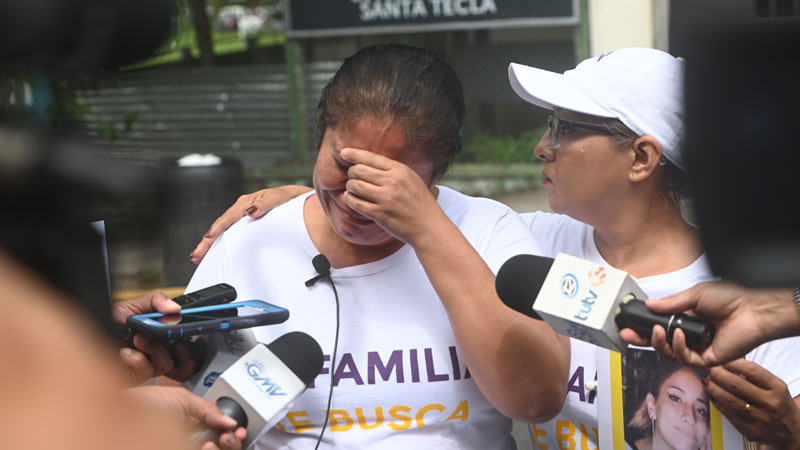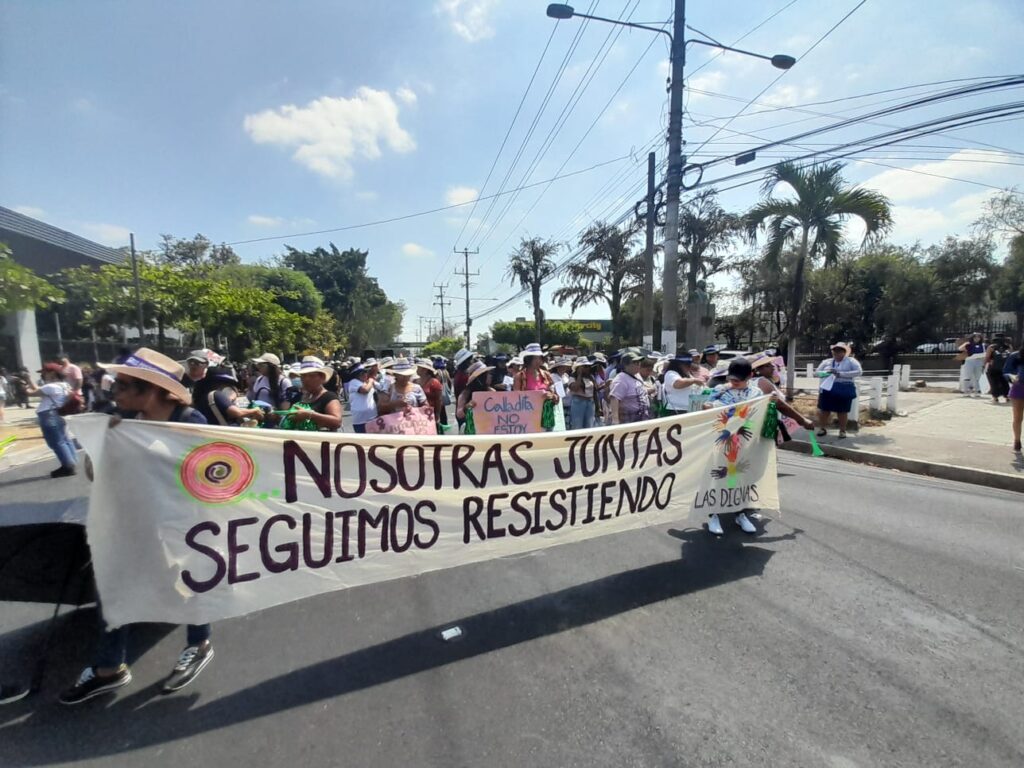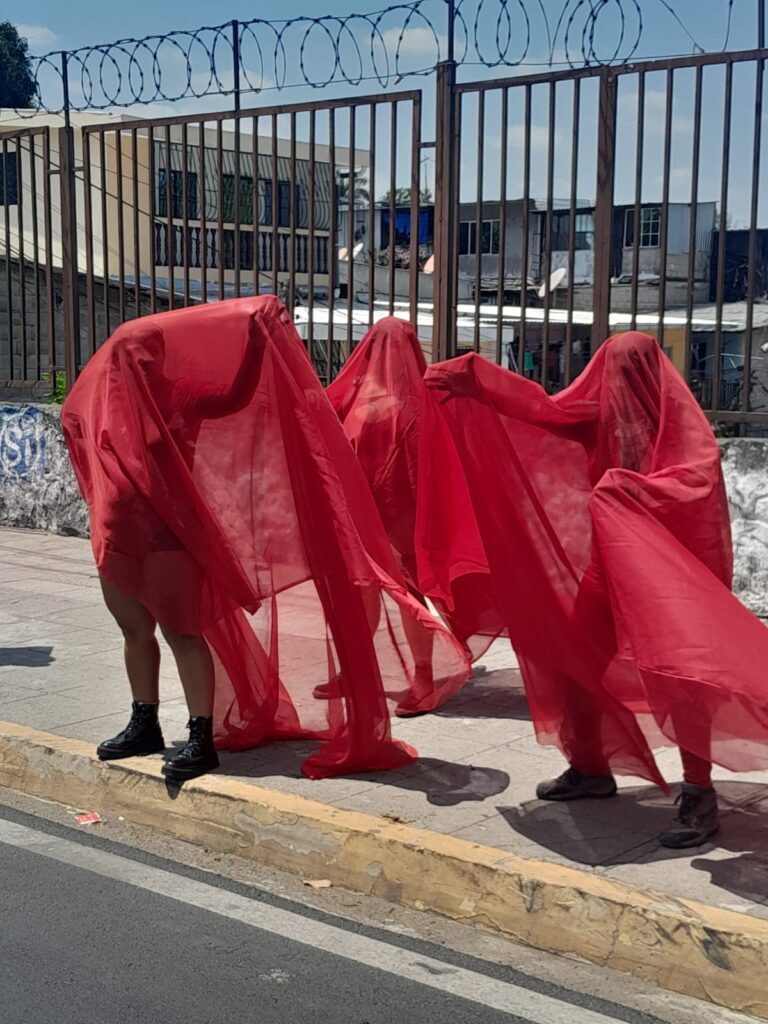The provision, one of the main cards of the ruling party in the recent general elections, is considered unconstitutional by human rights defenders, with figures of 225 fatalities, and has been carried out to intimidate and imprison those seeking justice for the victims.
BY: Nancy Hernández
On March 27, 2022, in El Salvador, the definitive and «legal» provision approved by the Legislative Assembly at the request of the Executive, called the Exception Regime, began as part of the Territorial Control Plan (PCT), with which the government aimed to take control of the territory from gangs.
According to official data between March 25 and 27, 2022, gang activity had claimed 87 victims. These figures, periodically recorded, placed the Central American country, with just over 22,000 square kilometers, as the deadliest in the world, even surpassing countries at war. This, officially but not in detail, was the trigger for the exception regime.
But it didn’t take more than a week for it to be officially known that 5,000 arrests had already been reported, causing hundreds of families to start looking for their relatives, of whom no information was known beyond rumors of «El Penalito,» a police holding cell where most of the detainees were initially taken.
The government stated that under the exception regime, associations and meetings have been prohibited to dismantle and prosecute criminal structures, the administrative detention procedure has been extended from 72 hours to 15 days, and communications of groups have been intervened.
Additionally, thousands of elements of the Armed Forces, used for citizen security purposes, completely surrounded areas considered sanctuaries for gangs, boarded public transport buses, and detained anyone on the streets with a «suspect» profile.
As a result, numerous cases of arbitrary detentions, mainly of young people suspected of belonging to a criminal group, began to be known.
This wave of arrests reached a community in the district of Colón, a region historically besieged by gangs. Among the captures reported was that of Paola Arana, a young woman of approximately 22 years old, who, according to spokespersons for the Block for the Search of Missing Persons in El Salvador, was detained simply for belonging to a community controlled by gang members.
Paola, according to Idalia Zepeda, a lawyer for the Salvadoran Association for Human Rights (ASDHEU), was transferred to a prison used for detained women, where she was threatened by a supposed group of female gang members, the main suspects in her disappearance reported in May 2022.
«The cause of Paola’s disappearance stemmed from a capture they made in the area after a police raid in which several young people and teenagers were taken away, so she mentioned having problems and threats in the detention center,» the source said.
The lack of concrete responses from the relevant authorities regarding cases of missing persons, as is common during this period of exception regime, led Paola’s mother, Verónica Delgado, around 42 years old, to actively join the Search Block to increase her chances of obtaining answers.
However, Verónica was also captured. Idalia Zepeda confirmed that during the second week of March, around five in the afternoon, during a procedure in the residential area, she was detained on charges of illicit associations.
Before Paola’s disappearance, Verónica worked in domestic jobs, then she took care of her little granddaughter, Paola’s daughter, who is currently under the care of other relatives.
«We don’t have concrete information to assess the degree or type of investigative work that led to an arrest, but undoubtedly, as we all know, the regime allows for the violation of human rights and skips basic due process guarantees,» Idalia said.
In that regard, she continued: «We as organizations are making a public complaint because we know that Mrs. Verónica is a hardworking and resilient woman who has been a victim of organized crime, because our main hypothesis is that organized crime or gangs disappeared her daughter.»
According to the defender, in these cases, families are revictimized because during the gang’s dominance, they threatened their children, demanded bribes, respect, imposed ways of life, everyday tasks, while government repression, instead of becoming a solution, ends up plunging entire communities into hopelessness.
«The same family has confirmed to us that they feel revictimized because they have suffered from the harassment of gang members in the area, the problems of arrests, raids, and searches in a impoverished community with the consequences of Paola’s disappearance and now the capture of her mother,» she said.
She also explained that she has been a victim of a state that has not prevented the phenomenon of disappearances and has not responded to a necessary comprehensive search process and has not provided answers to the case.
She also added that this phenomenon affects people with few resources who have structural, political, and economic causes that also now «unfortunately have the face of a woman, a mother, and an impoverished woman.»
«After the gangs tried to recruit their children, they became victims of law enforcement. Searching mothers have suffered from the captures of spouses, children, and siblings in raids in communities,» Idalia Zepeda, defender of the victims of the regime, said.
Regarding Verónica’s post-arrest procedure, after the 15 days, there will be a response from the hearing and transfers from holding cells to prisons where security forces do not guarantee the physical and emotional well-being of the detainees. Verónica is hypertensive and diabetic.
On the other hand, the Search Block does not rule out that the capture has its motivations in silencing those who speak out against the injustice perpetrated by the regime.
«We do not rule out that it is because of active participation in marches against the regime that the capture comes from this, but we cannot confirm it with certainty because it may be a coincidence due to being in a vulnerable situation because of the community where she resides,» the source added.
Regarding support for Verónica, the Block will provide legal assistance with private representation that will collect all the bonds that prove information to justify a substitute measure for detention, which will be known in the coming days after a first hearing.
This situation, perpetrated for almost two years in the country, according to the defending block, institutionalizes violence because it sets the pattern for establishing policies and generating actions and behaviors emanating from public authorities, officials, or police or military authorities against human rights defenders.
«It is not unlikely that any of us could be at risk, and undoubtedly, unfortunately, this will bring a consequence that politically immobilizes and disarticulates movements and scares us. In our case, there has been a trend since the exception regime to demobilize, fear, to question human rights organizations in general, NGOs, and work in communities, and therefore that demotivates and people are afraid, something that emotionally is valid,» the source said.
Furthermore, this situation, from the perspective of the organized population, affects the fragile democratic process established in the country after the peace agreements following a cruel civil war that lasted more than 12 years.
«Democracy is affected because we are supposed to have a participatory, free, and plural system in which the opinions and organizational actions of the opposition are respected, but that is not the case. It would seem that there are attitudes from the State that contradict the democratic spirit that centralizes power. There are also authoritarian actions by state institutions and coercive ones by the police and the Armed Forces; that undermines the democratic process that was being built in El Salvador since the peace agreements,» the source explained.
Furthermore, she said that there is a discourse of discrimination and hatred that also undermines democracy because there is a setback in transparency spaces, accountability, participatory spaces, oversight, from the territory and communities to state institutions.
Unconstitutional and Deadly Regime
According to Rina Monti, director of human rights investigations at the Cristosal Foundation, almost two years into the exception regime, various violations have been recorded, «the most obvious being arbitrary detentions, that is, unjustified deprivation of liberty and completely bypassing a judicial process.»
Ustedes escucharon el clamor de todo un pueblo.
Atendieron el llamado a luchar en esta guerra, con honor y valentía.
Decidieron poner el bienestar de todos, por encima del propio.
Eligieron proteger la vida de los salvadoreños, incluso a costa de su propia vida.
Y junto con… pic.twitter.com/sveZhHsjAb
— Nayib Bukele (@nayibbukele) May 7, 2023
Additionally, she explained that from the day the measure was decreed until March 5th, there were 3,624 reports of cases, and the rights of 3,772 individuals were violated.
According to a Cristosal database, 57.5% of the victims are between 18 and 30 years old, followed by 24.9% between 31 and 40, with the rest belonging to other age groups. In terms of gender, 84.9% are male and 14.7% are female.
Cristosal has also identified the events and perpetrators. In this case, 74% of the perpetrators are agents of the National Civil Police (PNC), 17.1% in conjunction with the Armed Forces of El Salvador (FAES), and 6.8% have been committed by FAES soldiers.
As for the events, 96.7% were identified as arbitrary detention, another 25% as illegal home raids, and another 9.9% as mistreatment. Additionally, 42.7% were detained in their homes, 22% in public places, and 14.8% at their workplaces.
Regarding the mortality rate of the regime, Cristosal has recorded 225 deaths, and 375 have reported cruel, inhuman, or degrading treatment.
«In 96% of cases, arbitrary detentions are reported, as well as other indirect victims such as family members who have suffered injuries, intimidation, threats, or internal forced displacement after the detention of one or two family members,» Monti emphasized.
The specialist also noted that the roles of the more than 76,000 detainees are not known, and there is no individualization of cases; instead, they are all receiving the same processes and sentences, «clearly outside the legal framework.» «To date, we do not really know what the legal justification is for the exception regime because obviously none of the legal frameworks support us remaining under the regime, nor is there clarity about what happened on the day the regime was decreed,» she clarified.
Beyond the obvious impact on victims who do not belong to criminal groups, Monti pointed out that the provision also opens up the possibility of other rights violations in the case of girls due to sexual violence and that, furthermore, the State does not have funds to protect victims, especially those in need of specialized attention.
«In many cases, especially those of children and adolescents, they also suffer intimidation and persecution by the National Civil Police; they capture the father and then start threatening the children that they will be captured,» she specified.
«A TIME BOMB»
Rina Monti asserts that the situation of human rights violations has become «a time bomb» for the Salvadoran government since there is no transparency regarding the data of the victims, and there is no openness with defenders at the local and international levels.
Furthermore, she affirms that the violence has escalated to intimidate and capture human rights defenders. «When the State has been questioned, it has evaded, but this is a time bomb because it is escalating against human rights defenders,» Monti maintains.
Likewise, she stated that the democratic state is paralyzed. «We no longer have independent bodies; the Supreme Electoral Tribunal (TSE), questioned for its role in the recent general elections, is using the same methodology to cover its ineffectiveness as the Executive does. Also, the main institutions such as the Attorney General’s Office, the Supreme Court of Justice, and the Legislative Branch are involved,» she said.
To this dynamic, the media is also added, mostly aligned with the ruling party or subject to some form of «censorship» that does not allow them to report on what happens in the country.
«That is not a democratic state; there are no constitutional guarantees of any kind, no instance where one can turn and receive a positive response from the State,» Monti added.
In general terms, Monti analyzed the lack of guarantees in general. «Particularly concerning is the issue of human rights defenders because the government’s narrative is aimed at positioning this population group as defenders of gang members when, according to Cristosal, 80% of the people we have worked with are victims of gangs,» emphasized the specialist.
Surprises, Accusations, and Fear After the Salvadoran Elections
The most coveted mayoralty by the ruling party is the only one won by an opposition party. However, the winner highlights that she will have to work hand in hand with the president. Meanwhile, fears of arbitrary constitutional reforms and fear of the Exception Regime increase.
Three figures in Salvadoran politics, from different scenarios, foresee a bleak future. Two of them point out possible scenarios that will worsen the situation for the population and consolidate Nayib Bukele and his allies in power.
The Most Coveted Municipality
It is the crown jewel, the municipality most desired in the recent elections due to its geographical proximity to the capital, the amount of income it receives, and because one of its districts, Nuevo Cuscatlán, is where the current president Nayib Bukele began his career as an elected official.
Antiguo Cuscatlán has been administered for 36 years by the same mayor: Milagro Navas. Nuevas Ideas, the ruling party, chose to present Michelle Sol, the Minister of Housing of the current government and the wife of the President of the Legislative Assembly, Ernesto Castro, as its candidate.
But it was all in vain. Navas’ victory was overwhelming, and her main opponent had to concede defeat just a few hours after the polls closed.
Thus, La Libertad Este, formed by the districts of Antiguo Cuscatlán, San José Villanueva, Nuevo Cuscatlán (still governed by Nuevas Ideas), Zaragoza, and Huizúcar, will be governed by Mayor Milagro Navas, in what will be her 13th term.
The victory is significant and will last throughout the term of the new municipalities that won, considering that La Libertad Este is the only one of the 44 municipalities to be administered by an opposition party, the Nationalist Republican Alliance (ARENA), and not by the ruling Nuevas Ideas party or any of its allies.
Nayib Bukele was the first to highlight that Nuevas Ideas or its allies had won 43 out of 44 municipalities in contention.
Milagro Navas’ response was: «He will not have 43 municipalities; he will have 44, because I join in working with the central government. We are going to change history; if we want to carry out projects, we have to work with the central government.»
Manipulation of the Constitution
There is a high likelihood that the Constitution will be modified to suit the interests of the ruling party.
This is the view of Eduardo Escobar, executive director of Citizen Action, who believes that «if we adhere to the authoritarian processes that have occurred in other countries, this is one of the few steps left.»
Escobar would not be surprised if the Government takes illegal routes to do so. He thinks they could follow the process established by the Constitution, which requires approval by a Legislative Assembly and ratification by the next one. But they could also create a new procedure «out of thin air, as they have done with several things.»
He considers it difficult to estimate when the Government will do it because it is unpredictable in many aspects.
But, in his opinion, one must bear in mind that some situations could lead them (the Government) to expedite the process or at least part of it.
He gives an example that next July there will be elections for Supreme Electoral Tribunal magistrates. «Will the government allow ARENA and the FMLN to occupy a seat or propose someone to be on the TSE?» he asks. He recalls that supposedly, TSE magistrates are non-partisan, but it is up to the FMLN and ARENA to promote or propose someone to occupy that position.
He doubts that the Nuevas Ideas party will allow it and wonders if they will reform the Constitution before to prevent the Nuevas Ideas party from sharing power on the Supreme Electoral Tribunal with other parties.
The process would be easy for the ruling party. It would be enough to approve the reform agreement in March and April, the first stage, so that in the following May, the new Legislative Assembly, mostly composed of Nuevas Ideas members, ratifies the reforms.
«So, I think it will depend. Someone may say, but they cannot do it so quickly. Of course, they can; they approve it in March and April, they can approve the reform agreement, which is the first stage, and in May, the next Legislative Assembly ratifies and reforms the Constitution regarding the Supreme Electoral Tribunal. So, in summary, it will depend on the government’s need, and that’s how the reform will be made, that is, it depends on the need they have. For example, what I told you may hasten them to do something, or they only reform regarding the Tribunal and leave it at that, or they already carry out the corresponding reform.»
He also leaves open the possibility that they do not need to reform the Constitution, that they simply invoke «the will of the people» and appoint TSE magistrates to their liking.
«Everything is possible; there is no mechanism, there is no institution that can stop such a claim,» he indicates, detailing that they can invent a referendum, plebiscite, and say that the people vote and say, «If we want the Constitution to be reformed.» That would give them the endorsement to adapt it to their needs.
There is Fear
A strong female voice within the Legislative Assembly, accustomed to pointing out and denouncing. Claudia Ortiz was elected for a second term by the Vamos party.
She considers it no coincidence that her party increased from 26,000 votes in 2021 to almost 100,000 in 2024 nationwide. She believes that her proposals have been important for the lives of Salvadorans who have recognized her work, despite the limitation of advertising resources.
But she is afraid. «We all feel fear; I feel fear, and it is logical when you see that there is a high level of arbitrariness, human rights are violated with impunity,» but she expresses that «the important thing is what we are going to do despite the fear.»
Abuses protected by the State of Emergency are seen everywhere, points out and cites the capture of Verónica Delgado, a member of Movir and the Search Block for Missing Persons under the state of emergency.
For Ortiz, «as long as the state of emergency becomes a tool to silence those who speak out, critical voices, anyone who could pose a threat to those in power, it will not be fair.»
She points out that those in power make false accusations with total impunity and cites as an example that after the election results in which she secured a second term as a legislator, there is a strong campaign alleging that the votes they received are from families of criminals.
«What we have is a hybrid regime, a mixture of structure and laws, there are processes, institutions. But in practice, there are distortions. It is a political system that mixes democratic aspects with authoritarian and corrupt aspects. Sometimes it is not known if it is in the midst of a democratic process or an illegal process,» accuses Ortiz.
She believes that the State of Emergency affects the democratic system, limits freedom of expression, and prevents citizens from exercising control over power, causing officials who should be «keeping the power in check» to be fearful.

She gives an example that during the scrutiny of each vote, members of Nuevas Ideas told their party’s monitors that if they continued taking photographs, they would be taken to jail.
But Claudia Ortiz is determined to continue her work in the same way she has done until today.
She talks about her work as a legislator, where she prioritizes access to housing, food, clean water, health, and education, because they are priorities for many families.
For her, it is important to continue working for respect for civil and fundamental rights, basic justice, access to justice, a life free from violence for women, and the right to access public information.
«We have presented proposals to make the state more transparent, reforms to the law on access to public information, removing VAT (Value Added Tax) from the basic basket, fair food quotas. This work seems to have given us the possibility of being back in the Legislative Assembly,» she emphasizes.
She details that there are sectors of society that feel represented by Vamos. For example, vendors who want to be integrated into city reorganizations, farmers who want to have a voice and be protagonists of solutions to climate change and food crisis, those affected by scams from land developers, and also all Salvadorans who aspire to have a country with justice without margin for error, where they can report, where the innocent can live free from state and gang violence.
She talks about the many loose ends that the State of Emergency has and considers that these, over time, reveal that it is not a security policy.
Before the regime, there was a trend of decreasing homicides and there were reports of truces made by investigative journalism.
The wave of homicides we had two years ago showed the perverse capacity of crime to use homicides as a pressure tactic.
«As far as whether that has changed or not, we are about to find out,» she says, expressing that curiously, organized crime did not resist the arrests, there were no confrontations. There is a loose end that remains unresolved.
She also states that as a legislative faction, they have denounced cases of innocent people who even with a judge’s acquittal are not released or are missing within the prison system.
«We denounce and take legislative actions against cases of criminals like Crook who was detained and released. It is documented by human rights organizations,» she says.
Another thing, the Minister of Justice said that they already had profiles of leaders of criminal groups. If so, why weren’t they captured before the wave of homicides?
Another inconsistency that concerns Claudia Ortiz is the number of unionists, vendors, and environmentalists who have been threatened with the state of emergency if they continue with their complaints.
She calls on people whose rights have been violated to activate national and international mechanisms. Activating legal mechanisms sets precedents and makes it possible in the future to determine responsibilities for human rights violations.






